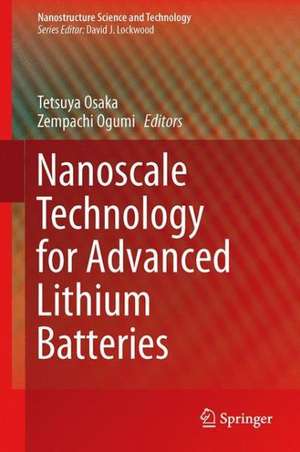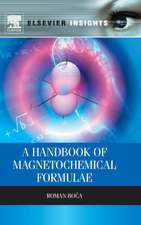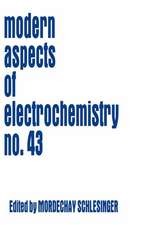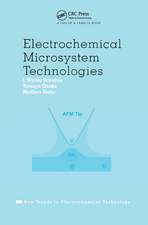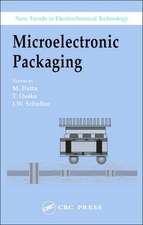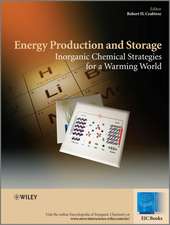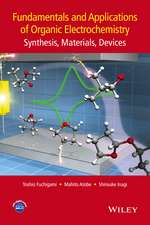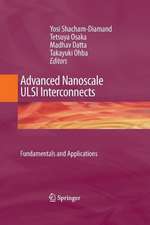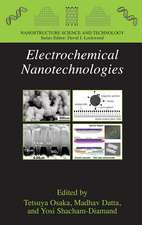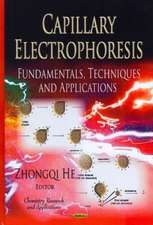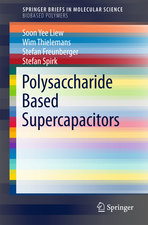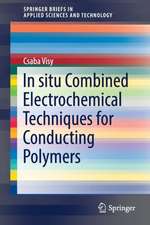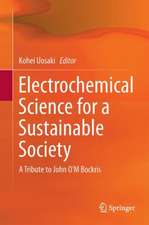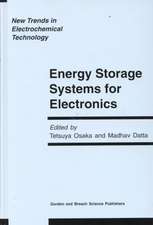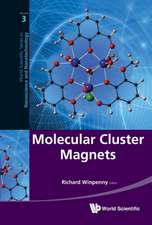Nanoscale Technology for Advanced Lithium Batteries: Nanostructure Science and Technology
Editat de Tetsuya Osaka, Zempachi Ogumien Limba Engleză Hardback – 12 noi 2013
| Toate formatele și edițiile | Preț | Express |
|---|---|---|
| Paperback (1) | 575.12 lei 38-44 zile | |
| Springer – 23 aug 2016 | 575.12 lei 38-44 zile | |
| Hardback (1) | 950.03 lei 6-8 săpt. | |
| Springer – 12 noi 2013 | 950.03 lei 6-8 săpt. |
Din seria Nanostructure Science and Technology
- 18%
 Preț: 1114.65 lei
Preț: 1114.65 lei - 18%
 Preț: 1001.02 lei
Preț: 1001.02 lei - 24%
 Preț: 834.57 lei
Preț: 834.57 lei -
 Preț: 405.66 lei
Preț: 405.66 lei -
 Preț: 405.28 lei
Preț: 405.28 lei - 18%
 Preț: 947.35 lei
Preț: 947.35 lei - 18%
 Preț: 734.27 lei
Preț: 734.27 lei - 15%
 Preț: 696.02 lei
Preț: 696.02 lei - 20%
 Preț: 585.29 lei
Preț: 585.29 lei - 20%
 Preț: 556.90 lei
Preț: 556.90 lei - 15%
 Preț: 646.62 lei
Preț: 646.62 lei - 18%
 Preț: 952.89 lei
Preț: 952.89 lei -
 Preț: 397.97 lei
Preț: 397.97 lei -
 Preț: 406.05 lei
Preț: 406.05 lei - 18%
 Preț: 967.08 lei
Preț: 967.08 lei - 18%
 Preț: 947.50 lei
Preț: 947.50 lei - 18%
 Preț: 948.29 lei
Preț: 948.29 lei - 18%
 Preț: 951.29 lei
Preț: 951.29 lei - 18%
 Preț: 948.92 lei
Preț: 948.92 lei - 18%
 Preț: 960.13 lei
Preț: 960.13 lei - 19%
 Preț: 559.01 lei
Preț: 559.01 lei - 15%
 Preț: 694.69 lei
Preț: 694.69 lei - 15%
 Preț: 635.15 lei
Preț: 635.15 lei - 15%
 Preț: 640.06 lei
Preț: 640.06 lei - 18%
 Preț: 948.79 lei
Preț: 948.79 lei - 20%
 Preț: 564.27 lei
Preț: 564.27 lei - 20%
 Preț: 628.33 lei
Preț: 628.33 lei - 15%
 Preț: 647.59 lei
Preț: 647.59 lei - 15%
 Preț: 643.16 lei
Preț: 643.16 lei - 15%
 Preț: 643.34 lei
Preț: 643.34 lei - 18%
 Preț: 955.08 lei
Preț: 955.08 lei - 15%
 Preț: 587.72 lei
Preț: 587.72 lei - 15%
 Preț: 649.87 lei
Preț: 649.87 lei - 15%
 Preț: 646.43 lei
Preț: 646.43 lei -
 Preț: 388.72 lei
Preț: 388.72 lei - 18%
 Preț: 955.25 lei
Preț: 955.25 lei - 5%
 Preț: 716.75 lei
Preț: 716.75 lei - 18%
 Preț: 952.89 lei
Preț: 952.89 lei - 18%
 Preț: 1258.46 lei
Preț: 1258.46 lei
Preț: 950.03 lei
Preț vechi: 1158.57 lei
-18% Nou
Puncte Express: 1425
Preț estimativ în valută:
181.81€ • 188.66$ • 151.96£
181.81€ • 188.66$ • 151.96£
Carte tipărită la comandă
Livrare economică 17-31 martie
Preluare comenzi: 021 569.72.76
Specificații
ISBN-13: 9781461486749
ISBN-10: 1461486742
Pagini: 284
Ilustrații: VIII, 273 p. 175 illus., 79 illus. in color.
Dimensiuni: 155 x 235 x 21 mm
Greutate: 0.58 kg
Ediția:2014
Editura: Springer
Colecția Springer
Seria Nanostructure Science and Technology
Locul publicării:New York, NY, United States
ISBN-10: 1461486742
Pagini: 284
Ilustrații: VIII, 273 p. 175 illus., 79 illus. in color.
Dimensiuni: 155 x 235 x 21 mm
Greutate: 0.58 kg
Ediția:2014
Editura: Springer
Colecția Springer
Seria Nanostructure Science and Technology
Locul publicării:New York, NY, United States
Public țintă
ResearchCuprins
Energy systems for green community.- Positive electrodes of Nano-scale for lithium ion batteries (focusing on nan-size effects).- Nano-aspects of Advanced Positive Electrodes for Lithium Ion Batteries.- Nano-aspects of Carbon Negative Electrodes for Li-ion Batteries.- Advanced negative electrodes of Nano-scale for Li-ion Batteries.- Polymer and Ionic Liquid Electrolytes for Advanced Lithium Batteries.- Development of glass-based solid electrolytes for lithium ion batteries.- 3DOM Structure for Battery Electrode and Electrolyte.- DC methods for Battery evaluation.- Characterization of neighbor atoms (X-ray absorption) (Covering wide area of XAFS and XANES).- AC methods for Battery evaluation.- NMR Study of Lithium-Ion Battery.- Nano-aspect of Vibration Spectra Methods in Lithium-ion Batteries.- Nano-aspects of Metal Air Batteries.- Lithium/Air Battery.- Nano-Aspects of Lithium/Sulfur Batteries.- Possibility and Prospect for Future Energy Storages.
Notă biografică
Professor Tetsuya Osaka is a professor in the Department of Applied Chemistry, Waseda University, Tokyo, Japan - a position he has held since 1986. He has contributed as an author and/or editor of more than 70 books and published more than 890 original and review papers in these fields. He has been identified as one of the Highly Cited Researchers in the Materials Science category on the website of Thomson Scientific’s ISIHighlyCited.com. Ogumi's technical contributions have been recognized by many awards including Medal with Purple Ribbon bestowed from the Decoration Bureau of the Cabinet Office, Japan . He received Research Award of the Electrodeposition Division of ECS in 1996 and was elected a Fellow of ECS (2002), IEEE (2002), IUPAC (2004) and ISE (2006).
Professor Zempachi Ogumii is an Adjunct Professor of the Innovative Collaboration Center at Kyoto University, Kyoto, Japan. He graduated from Kyoto University in 1968 and received his Doctorate Degree from the Graduate School of Engineering, Kyoto University in 1974. After a short time in the industry, he became a research associate at the Fritz-Haber Institute of Max-Planck Foundation in Berlin from 1975 to 1976. In 1976, he joined Kyoto University and worked there until 1992 as a professor for the Graduate School of Engineering. In addition to teaching at Kyoto University, Ogumi is also a visiting professor of Waseda University and has published over 300 scientific papers on batteries, fuel cells, and electrolysis.
Professor Zempachi Ogumii is an Adjunct Professor of the Innovative Collaboration Center at Kyoto University, Kyoto, Japan. He graduated from Kyoto University in 1968 and received his Doctorate Degree from the Graduate School of Engineering, Kyoto University in 1974. After a short time in the industry, he became a research associate at the Fritz-Haber Institute of Max-Planck Foundation in Berlin from 1975 to 1976. In 1976, he joined Kyoto University and worked there until 1992 as a professor for the Graduate School of Engineering. In addition to teaching at Kyoto University, Ogumi is also a visiting professor of Waseda University and has published over 300 scientific papers on batteries, fuel cells, and electrolysis.
Textul de pe ultima copertă
The unfortunate and serious accident at the nuclear power plants in Fukushima, Japan caused by the earthquake and tsunami in March 2011 left Japan with a serious blow. Japan was deprived of electric power. This problem further accelerated the introduction of renewable energies. This book surveys the new materials and technologies needed to welcome the next generation of energy conversion and storage devices, such as lithium secondary batteries on the basis of nanotechnology. Most of the contributors for this book are from institutions researching lithium batteries. This book provides an overview of nanotechnology for lithium batteries from basic to applied research in selected high technology areas. The book especially focuses on near-term and future advances in these fields.
Caracteristici
Surveys new materials and technologies Utilizes next generation of energy conversion Discusses storage devices Discusses the basis of nanotechnologies
